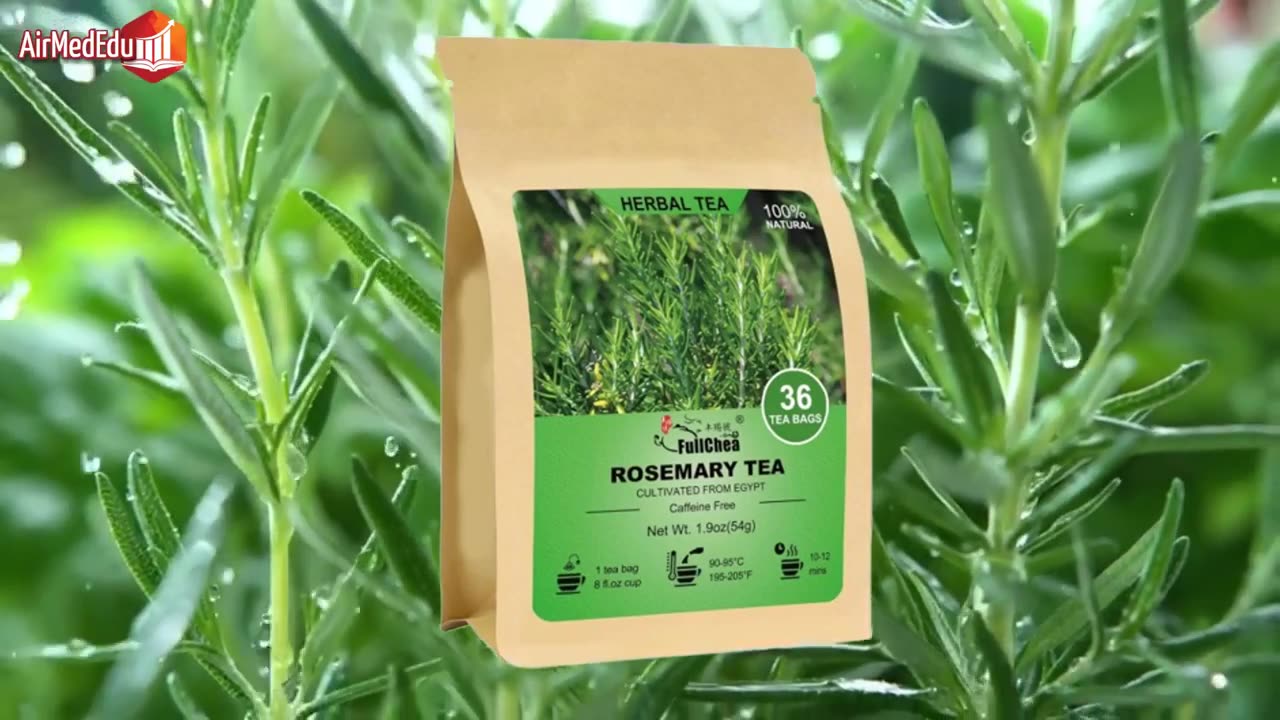Premium Only Content

Effect of Rosemary Infusion on the Body
Rosemary, scientifically known as Rosmarinus officinalis, is a perennial plant native to the Mediterranean basin that has been valued since ancient times for its aromatic and medicinal properties. In its infusion form, it is prepared by boiling its fresh or dried leaves in water, releasing an essence that not only delights the palate with its bitter and slightly minty flavor, but also imbues the body with a series of bioactive compounds capable of profoundly interacting with our physiological systems. This infusion, consumed hot or cold, acts as a bridge between herbal tradition and modern science, where its effects are primarily due to the presence of phenolic acids such as rosmarinic and carnosic acids, along with flavonoids, terpenes, and essential oils. These elements operate at the cellular level, modulating inflammatory, oxidative, and enzymatic processes in the body, promoting a balance that can influence everything from digestion to cognitive function.
Rosemary's action on the body begins in the gastrointestinal tract, where its carminative properties stimulate gastric secretions and facilitate intestinal motility, helping to break down food and expel accumulated gas. Beyond digestive functions, its antioxidant compounds neutralize free radicals, preventing oxidative damage in tissues such as the liver and brain, while its diuretic effect increases renal filtration to eliminate toxins and excess sodium. In the circulatory system, it acts as an antiplatelet agent, thinning the blood and improving flow, which reduces viscosity and prevents blood clot formation. Neurologically, it crosses the blood-brain barrier to enhance cholinergic activity, promoting memory and reducing oxidative stress associated with brain aging. Immunologically, its terpenes exhibit antimicrobial activity, inhibiting bacterial growth in mucous membranes and skin, and anti-inflammatoryally, it modulates cytokines to relieve chronic pain. This multifaceted interaction makes rosemary a holistic modulator, which does not cure diseases per se, but supports bodily homeostasis when integrated into a balanced lifestyle.
One of the most immediate benefits of rosemary infusion lies in its ability to improve digestion, relieving postprandial heaviness and stimulating appetite in those suffering from functional anorexia. When consumed after meals, its antispasmodic properties relax intestinal muscles, reducing cramps and spasms that often accompany irregular diets. This effect extends to the alleviation of heartburn, where rosemary neutralizes excess hydrochloric acid without interfering with the natural production of digestive enzymes. Furthermore, it acts as a potent carminative, reducing gas formation in the colon and preventing flatulence that causes abdominal bloating, making it an ideal ally for those dealing with irritable bowel syndrome. At the same time, it promotes the expulsion of bile retained in the gallbladder, improving fat emulsification and preventing biliary dyspepsia that arises after heavy meals.
Another area where rosemary exerts its action is in the cardiovascular system, where its infusion promotes smoother blood circulation by inhibiting platelet aggregation, thus reducing the risk of blood clots in deep veins. This is especially useful during periods of immobility, such as long trips or postoperatively. This antiplatelet property not only prevents thrombosis but also relieves the sensation of heavy legs and the appearance of varicose veins by increasing oxygen in peripheral tissues. As a natural diuretic, the infusion stimulates urine production, eliminating excess retained fluids and toxins accumulated in the kidneys, which contributes to lower blood pressure and provides relief in cases of mild edema. This purifying effect is complemented by its hepatoprotective role, where it protects liver cells from oxidative damage induced by alcohol or medications, restoring the liver's detoxifying function and reducing discomfort after overeating.
In the cognitive realm, rosemary offers notable benefits by enhancing memory and concentration, thanks to its influence on the neurotransmitters that regulate sustained attention, making the infusion a helpful aid for students or professionals during periods of high mental stress. Preliminary studies suggest that it may slow the progression of neurodegenerative diseases such as Alzheimer's by inhibiting the accumulation of amyloid plaques and protecting neurons from oxidative apoptosis. This neuroprotective action extends to reducing mental fatigue, combating the fatigue accumulated from exhausting workdays and restoring mental clarity through a mild stimulating effect without the caffeine euphoria. It also relieves tension headaches by dilating cerebral vessels and reducing vascular inflammation, providing natural relief similar to a relaxing massage for the mind.
Rosemary's anti-inflammatory action is not limited to the internal environment; externally, as a hair rinse, it strengthens hair strands by improving microcirculation in the scalp, promoting hair growth and reducing premature hair loss associated with stress. This benefit is combined with the reduction of excessive oiliness and dandruff, where its antiseptics fight fungi and bacteria in the hair follicle, leaving hair more vital and shiny. Internally, this anti-inflammatory property relieves joint and muscle pain, such as in cases of arthritis or tendonitis, by modulating inflammatory prostaglandins and reducing swelling without the sedative effects of conventional analgesics. At the deep digestive level, it combats chronic gastritis by coating the gastric mucosa with a protective layer, preventing ulcers and promoting epithelial regeneration.
As a natural antibiotic, rosemary infusion is effective against pathogens such as Escherichia coli and Salmonella, inhibiting their adhesion to intestinal and urinary mucosa, making it useful for mild infections of the digestive tract or urinary system. This antimicrobial effect extends to oropharyngeal conditions, such as pharyngitis or stomatitis, where rinses with the infusion disinfect the mouth and soothe sore throats through its balsamic action. In parallel, its anticancer potential, observed in animal models, lies in the induction of apoptosis in tumor cells and the inhibition of angiogenesis, suggesting a complementary role in the prevention of certain cancers, although always under oncological supervision. For glycemic control, rosemary sensitizes cells to insulin, lowering blood sugar levels and supporting the management of type 2 diabetes as a dietary adjuvant.
Beyond the physical benefits, rosemary acts as a general stimulant against chronic fatigue, boosting vitality without overloading the nervous system, ideal for combating autumn apathy or post-viral exhaustion. In women, it relieves dysmenorrhea by relaxing the uterus and reducing menstrual cramps through its antispasmodic properties, balancing hormonal flow without disrupting the cycle. Its healing effect accelerates the repair of skin wounds, promoting collagen synthesis and preventing infections in dermatitis or minor scrapes. As a supreme antioxidant, it counteracts premature aging by protecting cellular DNA from oxidative mutations, maintaining skin elasticity and vascular integrity. Finally, it reduces stress and anxiety by modulating the hypothalamic-pituitary-adrenal axis, promoting a state of calm that improves restful sleep and daily emotional resilience.
Preparing rosemary infusion is simple and accessible, requiring only fresh or dried leaves of the plant, preferably organic to avoid pesticide residues. For a standard cup, two tablespoons of leaves are poured into 250 milliliters of boiling water, covering the container to retain the volatiles and letting it steep for three to five minutes, the optimal time to extract the active ingredients without making the beverage excessively bitter. Once strained, it is drunk warm to maximize gastrointestinal absorption, although chilled with a touch of lemon adds vitamin C without compromising its benefits. Regarding dosage, it is recommended to consume three to four cups a day, divided after meals to enhance digestion, without exceeding 15 grams of the herb daily to avoid overload. This regimen can be maintained for up to three consecutive months, followed by a one-month break, allowing the body to reset its response and preventing tolerance buildup.
However, like any herbal remedy, rosemary infusion carries potential side effects that deserve attention, especially with prolonged use or high doses. The most common is gastric irritation, manifesting as nausea, vomiting, or abdominal cramps when the recommended dose is exceeded, as its essential oils can become pro-inflammatory in excess. On sensitive skin, direct topical applications cause contact dermatitis or erythema, with redness and itching that persist for hours. For people with epilepsy, rosemary can trigger seizures by unpredictably stimulating the central nervous system due to its terpenes, which cross the blood-brain barrier. Furthermore, its intense diuretic action risks dehydration if not compensated with adequate water intake, exacerbating fatigue or muscle cramps in hot climates.
Precautions are essential to avoid serious complications, starting with its absolute contraindication in pregnant and breastfeeding women, as it may induce uterine contractions or alter milk composition through mild estrogenic effects. Children under five years of age should avoid it due to its stimulating power, which could alter early neurological development. In the presence of gallstones, rosemary accelerates gallbladder drainage, risking painful duct obstructions, so prior medical evaluation is required. It interacts with anticoagulants such as warfarin, increasing bleeding by adding antiplatelet effects, and with diuretics or lithium, altering electrolyte balance and serum levels. For hypertensive or diabetic patients, although beneficial, it should be monitored under supervision, as it modulates blood pressure and glucose variably. Always consult a healthcare professional before incorporating this infusion into chronic routines, especially if combined with medications, remembering that rosemary complements, but does not replace, conventional medical treatments.
In short, rosemary infusion emerges as a versatile elixir that, in moderation and with awareness, enriches holistic well-being, weaving its antioxidant and regulating effects into the fabric of the body to promote vitality and balance. Its legacy, from ancient Roman practices to contemporary evidence, invites us to explore it with respect, transforming a simple herb into a profound and transformative self-care ritual.
-
 4:09
4:09
Memology 101
14 hours ago $0.72 earned"Journalist" REPEATEDLY tries and FAILS to bait John Fetterman into calling Trump an "AUTOCRAT"
4.84K13 -
 58:02
58:02
Dialogue works
2 days ago $3.44 earnedMatthew Hoh: Ukraine’s Army Is COLLAPSING Everywhere!
28.2K17 -
 17:24
17:24
Nate The Lawyer
1 day ago $1.98 earnedBREAKING: NEW Scientific Evidence Shows Men Are Better in Sports Than Women
13.7K12 -
 29:43
29:43
Code Blue Cam
1 day agoHow Missing Dipping Sauce Turned into a Felony Arrest
15.8K12 -
 16:19
16:19
BlaireWhite
2 days agoWoman Confronts "Trans Woman" In Locker Room: Gold's Gym Scandal
15.3K10 -
 2:15:40
2:15:40
Side Scrollers Podcast
20 hours agoWTF Happened to Call of Duty?! + Ubisoft’s MAJOR F Up + Vtuber HIT LIST + More | Side Scrollers
68.3K16 -
 18:31
18:31
Nikko Ortiz
16 hours agoKaren You Need A Shower...
15.5K12 -
 9:47
9:47
MattMorseTV
18 hours ago $15.77 earnedDemocrats CAUGHT in $15,000,000 LIE.
26.7K43 -
 43:24
43:24
ThisIsDeLaCruz
20 hours ago $1.97 earnedWhat Fans Never Knew About Falling In Reverse’s Guitarist
13.1K -
 24:53
24:53
GritsGG
16 hours agoInsane 3998 Warzone Wins! Rank 1 Player Keeps 36 Win Streak!
16.7K